
Many Muslim scholars and followers have different perspectives on tattoos when asked, “Can Muslims get tattoos?”. While many young Muslims today have tattoos and see nothing wrong with them, many believers believe it is against Islamic law and support the prohibition of tattoos. While Islam does allow certain forms of body decoration, permanent tattoos are not one of them. In this article, we will examine in detail why tattoos are forbidden in Islam and the permissible alternatives to them. Don’t wait any longer and scroll down to find out more.
Are Muslims allowed to get tattoos?
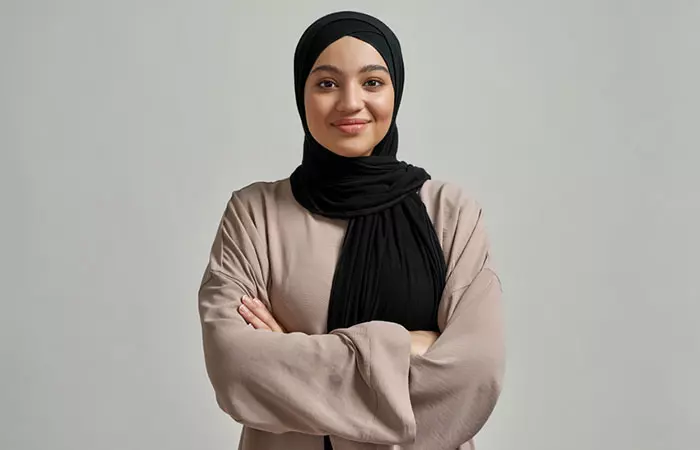 Image: Shutterstock
Image: Shutterstock
The main Muslim opinion on permanent tattoos is that they are not allowed according to Islamic traditions and laws. Many Islamic scholars consider the ancient practice of tattooing a sin because of a hadith (a traditional account of things said and done by the Prophet Muhammad that serves as a guide for Muslims in religious matters). Such a decree states that anyone who gets a tattoo on themselves or gets a tattoo on someone else will be cursed.
Tattoos are not specifically mentioned in any Quranic verse, however, one Quranic verse does speak about not injuring or hurting the body without a valid reason.
However, it is important to understand that Quranic verses and hadith have different religious interpretations in different cultures. While Sunni Muslims strictly prohibit tattoos, the rules for tattoos for Shia Muslims are slightly different. They claim that there are no direct instructions about tattoos in the Holy Quran or hadith. So tattoos for cultural practices can be allowed as long as they do not depict idols, Quranic verses, or anything that goes against spiritual traditions. The display of tattoos for Muslim women should be decent and not offensive to religious figures or beliefs.
Tattoos are also viewed differently in different countries. Egypt is an Islamic country with one of the oldest tattoo customs in the world. Although there are mixed opinions about tattoos now, their popularity is still intact. Some religious figures in Tunisia have allowed tattoos for cultural identification. Despite religious barriers, Tunisian tattoos as an art form seem to have a bright future as young people are gravitating towards religious tattoos and contemporary tattoo designs.
Although some Muslim communities accept tattooing practices, permanent tattoos are generally prohibited in Muslim communities. Check out the next section to learn more about the reasons behind the ban on tattoos.
Why does Islam prohibit tattoos?
Although no reason is given in the hadith in Sahih Bukhari for the prohibition of tattoos, several Muslim scholars have given the following arguments for the prohibition of tattoos:
1. Unnecessary pain
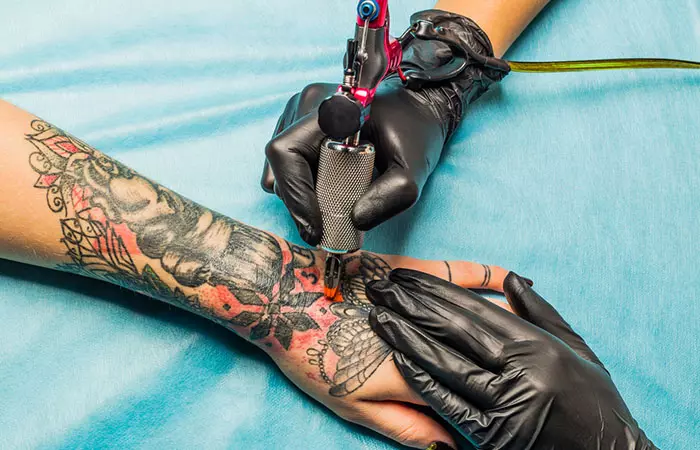 Image: Shutterstock
Image: Shutterstock
Tattooing is basically creating a wound on the skin to make it colorful and different. It is mutilation of the human body, which is forbidden in the Quran. Also, tattooing can increase the risk of infection, which can further damage the creation of the Almighty.
2. Disrespecting the creation of the Almighty
Tattooing involves altering the body given to you by the Almighty. This is considered disrespectful to the artistry of the Almighty.
3. Adhering to the tradition of non-believers
Tattoos are associated with non-believers who get religious tattoos. Therefore, permanent tattoos on the body would be seen as an adherence to their faith rather than Islam.
However, many Islamic scholars argue that there can be different religious interpretations of this hadith. Muslim women are allowed to wear jewelry. Therefore, piercing is allowed. Orthodontic braces or nose jobs are allowed for medical reasons. Also, non-permanent tattoos are part of many Islamic cultures. Therefore, there cannot be one strict interpretation. Therefore, the discussion around tattoos is largely debatable.

People with tattoos can go on Hajj (the annual pilgrimage to Mecca). However, they must ensure that the tattoos are properly covered before going on Hajj.
The reasons mentioned above tell you why tattoos are forbidden in Islam. But what if you have one? Can we pray with a tattoo? Find out in the next section.
Can you pray with a tattoo in Islam?
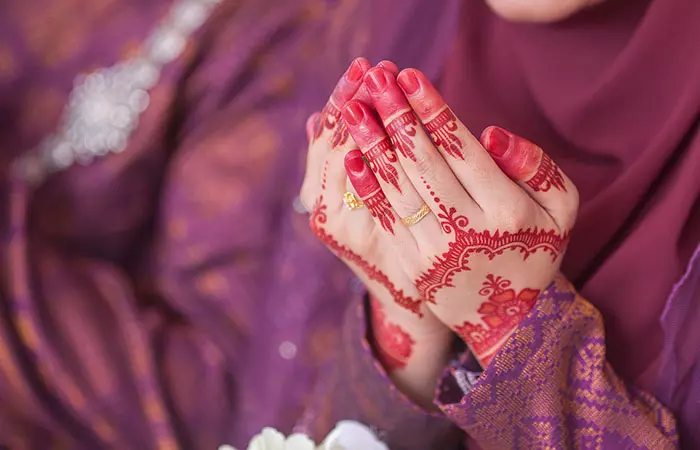 Image: Shutterstock
Image: Shutterstock
Although tattoos are considered haram for the reasons mentioned above, one can pray with a tattoo if one had it before becoming Muslim. According to Islam, Allah forgives the sins of those who repent seriously and sincerely, and erases all their previous deeds.
A ritual sense of cleanliness and purity is a requirement for a Muslim to pray or perform Namaz. Prayer is performed five times a day and Wudu is an essential ritual washing in which one cleanses one’s limbs, face and neck before praying. It is mandatory that water reaches every part of the dirty body that is being cleansed during Wudu.
Since tattoo ink is under the skin and does not prevent water from cleansing the skin, it is not considered a hindrance in prayer or religious practices in the technical sense. However, if any part of the tattoo prevents water from cleansing the skin, then Wudu and thus the prayer are invalidated.
Although one can pray with a tattoo, Muslim scholars advise against getting one. Instead, there are a number of non-permanent tattoo options one can try. Check out the next section to learn more about temporary contemporary tattoos.
Alternatives to tattoos
Although permanent tattoos are generally not in line with Islamic traditions and laws, the Islamic view on non-permanent tattoos is relatively more lenient than permanent tattoos. If you enjoy body art and don’t want to go against your religious rules, you can try the following alternatives to get modern tattoos legal in Islam.
1. Henna
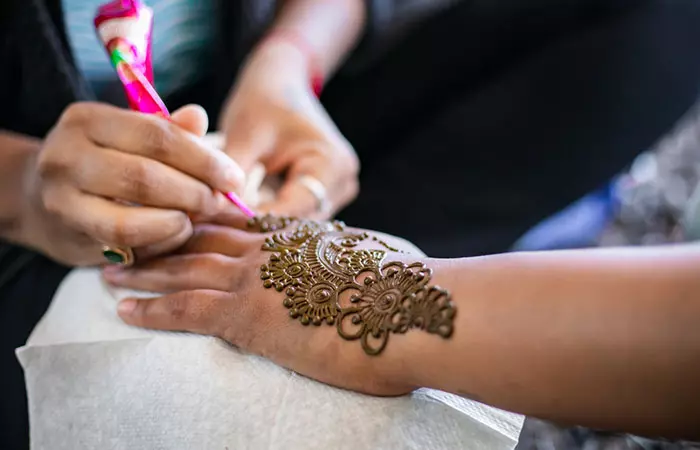 Image: Shutterstock
Image: Shutterstock
Henna is a plant-based dye that has been used for centuries in many Islamic cultures. Muslim women use henna to create temporary tattoos on their hands and body. Temporary henna tattoo is used especially during auspicious occasions such as weddings and Eid.

Henna tattoos are applied in Afghanistan by the bride and groom before the wedding as a symbol of good luck and prosperity.
2. Body paint
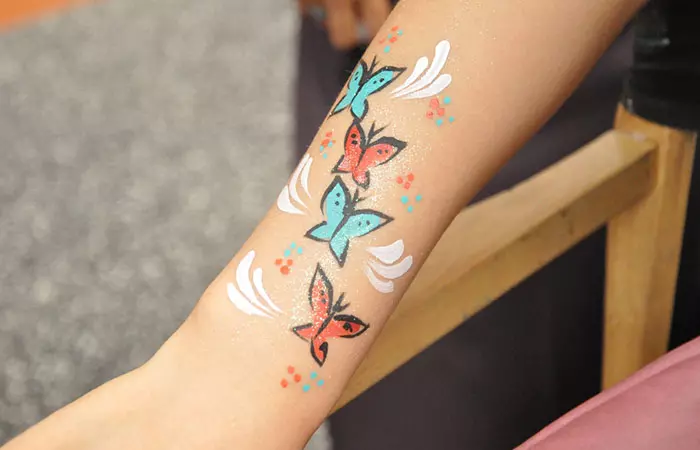 Image: Shutterstock
Image: Shutterstock
Another alternative to permanent tattoos are body paintings made with non-toxic washable colors for temporary tattoos that can be easily removed with soap and water. Body painting can be used by Muslim women or men to express their individuality without breaking Islamic laws.
These are non-permanent options that do not involve permanently changing your body. They represent joy and happiness and can be a great way to celebrate festivals like Eid-Ul-Fitr.
However, non-permanent tattoos with inappropriate depiction of images or idols are also not allowed.
There has been a debate about tattoos in Islamic culture by religious scholars and followers. Islamic scholars argue that tattoos are forbidden in Islam because they involve harming oneself and altering the body given by the Almighty. However, if a person got a tattoo before converting to Islam, he or she may not have to remove the tattoo. It is perfectly okay to pray with a tattoo after sincerely repenting for it. Popular and non-permanent tattoo options that are allowed in Islam, such as henna and body painting, are a great way to express yourself without breaking Islamic laws.
Frequently Asked Questions
Can I convert to Islam if I have tattoos?
Yes, anyone can convert to Islam after sincere repentance for the sins committed.
How does the perception of tattoos within Islam differ by generation?
Practicing Muslims of all generations generally consider permanent tattoos to be haram, meaning they are forbidden under Islamic law. However, many non-practicing Muslims in younger generations have embraced modern tattoos as a form of expression and resistance.
Is there a historical or cultural tradition of tattoos within certain Muslim communities?
Yes, despite tattoos being considered haram by most Islamic scholars, tattoos are popular in certain Muslim communities in North Africa and the Middle East. People get protective tattoos and work as freelance tattoo artists to beautify themselves and protect themselves from diseases.
Key Points
Tattooing is generally considered haram by Sunni Muslims. However, Shia Muslims allow tattoos for cultural purposes. Changing the creation of the Almighty and causing unnecessary pain to the body are some of the reasons why tattoos are forbidden in Islam. Having tattoos will not hinder one’s prayer as water can reach them, despite being under the skin, during Wudu (purification ritual before prayer). Henna and body painting are the two most popular alternatives to permanent tattoos for Muslims.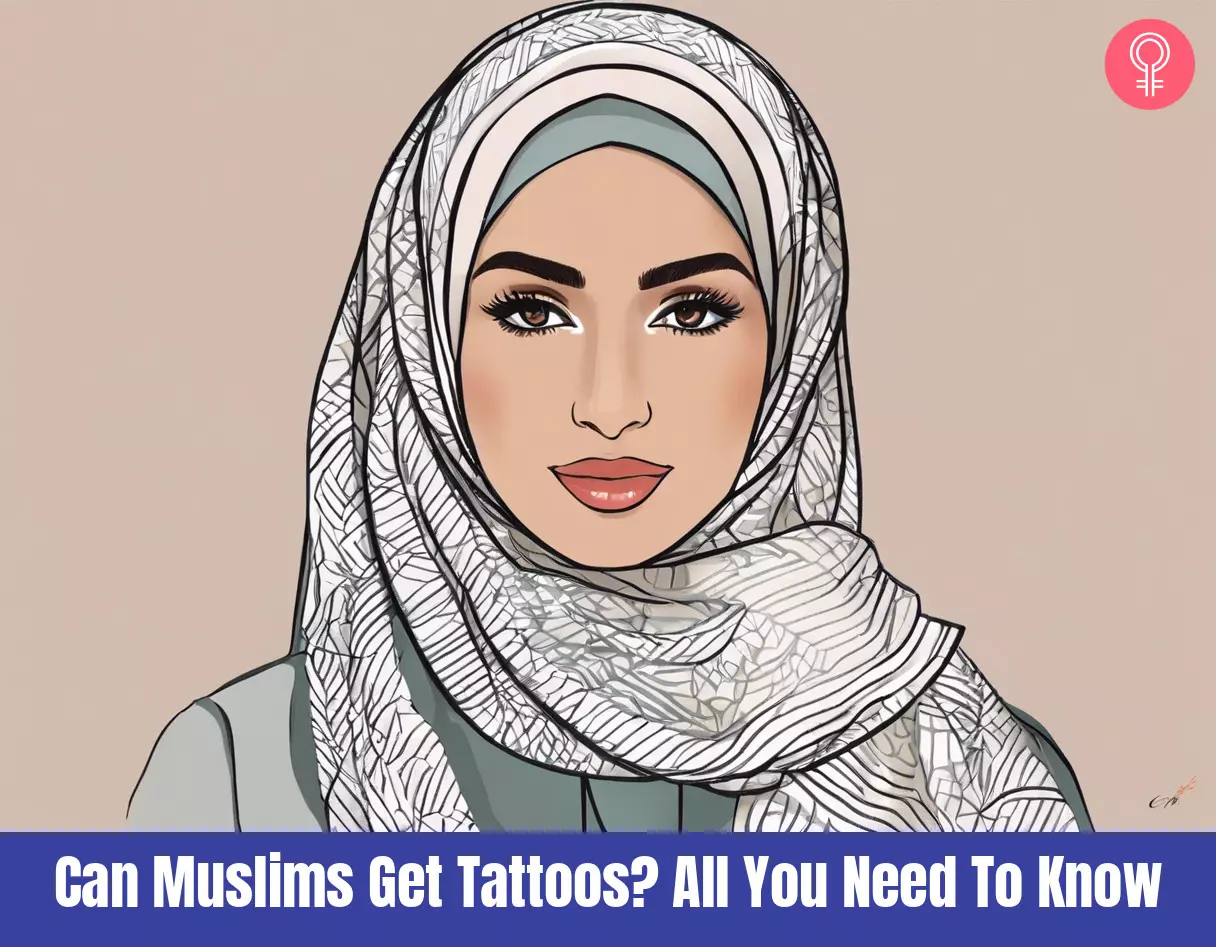
Image: Stable Diffusion/StyleCraze Design Team
Tattoos are forbidden in Islamic traditions and laws based on the holy book of the Quran. Watch this video to learn more about the instructions regarding this ancient form of body modification in the Quran!
Was this article helpful? ReviewerAuthorEditorFact Check
![]() Ali Aman is a professional tattoo artist from Kazakhstan. He is a self-taught tattoo artist who learned most of his skills related to this craft from online platforms such as YouTube. He moved to the US a few years ago and has been tattooing since 2022.
Ali Aman is a professional tattoo artist from Kazakhstan. He is a self-taught tattoo artist who learned most of his skills related to this craft from online platforms such as YouTube. He moved to the US a few years ago and has been tattooing since 2022.
Read Ali Aman’s full biography
![]() Gazala Ansari is a beauty and lifestyle writer with two years of experience. She writes on relationships, makeup and lifestyle and holds a Bachelor’s and Master’s degree in English Literature from Central University of Jharkhand.
Gazala Ansari is a beauty and lifestyle writer with two years of experience. She writes on relationships, makeup and lifestyle and holds a Bachelor’s and Master’s degree in English Literature from Central University of Jharkhand.
Read the full biography of Gazala Firdos Ansari
![]() Eshna is an associate editor and certified skin care coach. She has over three years of experience, a triple major bachelor’s degree in psychology, English and journalism from Mount Carmel College, Bengaluru, and a master’s degree in psychology from Sampurna Montfort College, Bengaluru.
Eshna is an associate editor and certified skin care coach. She has over three years of experience, a triple major bachelor’s degree in psychology, English and journalism from Mount Carmel College, Bengaluru, and a master’s degree in psychology from Sampurna Montfort College, Bengaluru.
Read the full biography of Eshna Das
![]() Shreya is a beauty and lifestyle writer with two years of experience. After graduating from Christ University, Bengaluru, she started as an intern writer for a non-profit organization, Bhumi. After that, she wrote for a progressive content website.
Shreya is a beauty and lifestyle writer with two years of experience. After graduating from Christ University, Bengaluru, she started as an intern writer for a non-profit organization, Bhumi. After that, she wrote for a progressive content website.
Read Shreya Mukherjee’s full biography
Leave a Reply